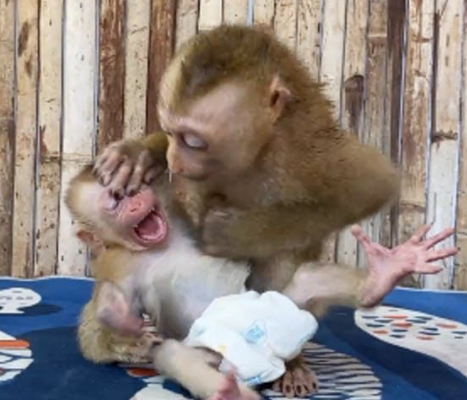Controlling a fight between a big monkey and a small monkey requires a thoughtful approach to ensure the safety and well-being of both animals. Here are some key strategies:
Environmental Management
- Separation: The first step is to physically separate the monkeys to prevent immediate harm. Use barriers, such as gates or partitions, to keep them apart until a more permanent solution can be found.
- Space Allocation: Ensure each monkey has enough space to avoid feeling threatened or cornered. Overcrowding can exacerbate aggressive behavior.
Behavioral Interventions
- Distraction: Use distractions to divert their attention away from each other. Toys, food, or other engaging items can help shift their focus.
- Positive Reinforcement: Encourage positive interactions by rewarding calm behavior. Use treats or verbal praise when they are calm and peaceful around each other.
Training
- Desensitization: Gradually increase their exposure to each other in a controlled manner. Start with short, supervised interactions and slowly extend the duration as they become more accustomed to each other’s presence.
- Obedience Training: Teach basic commands and behaviors that can help manage their actions. This training can provide better control over the situation and reduce aggressive tendencies.
Health and Well-being
- Regular Check-ups: Ensure both monkeys are in good health. Sometimes, aggression can stem from underlying health issues or discomfort.
- Enrichment: Provide mental and physical enrichment to keep them stimulated and reduce stress. Monkeys that are bored or stressed are more likely to display aggressive behavior.
Expert Consultation
- Veterinarian or Behaviorist: Consult with a veterinarian or an animal behaviorist who specializes in primates. They can provide tailored advice and strategies based on the specific situation and the monkeys’ individual personalities.
Long-term Solutions
- Permanent Separation: In some cases, it may be necessary to permanently separate the monkeys if repeated attempts at integration fail and the safety of either animal is at risk.
- Rehoming: Consider rehoming one of the monkeys if their coexistence proves too challenging. Ensure that the new environment is well-suited to the monkey’s needs.
By employing these strategies, it is possible to manage and mitigate aggressive interactions between a big monkey and a small monkey, prioritizing their safety and well-being.
